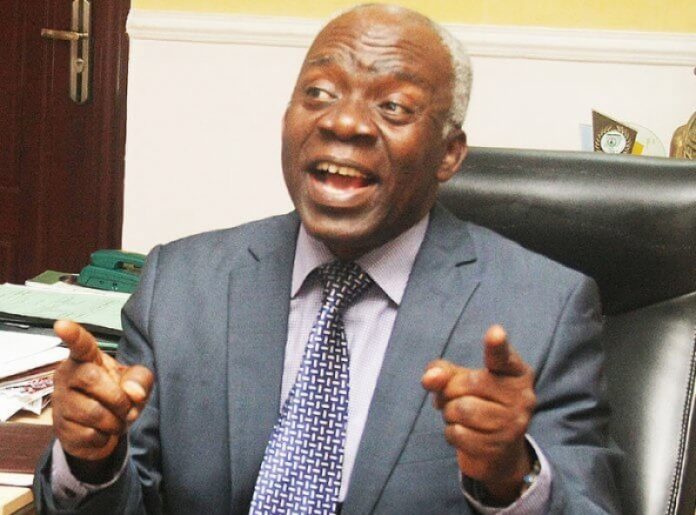…calls Inspector General of Police, Kayode Egbetokun to arrest policemen who prevented Bello’s arrest, and further withdraw policemen from the ex-governor.
As the attempted arrest of former Kogi State Governor, Yahya Bello by the Economy and Financial Crimes Commission (EFCC) was stopped via the order of a Lokoja High Court on Wednesday, human rights lawyer, Femi Falana SAN says no court has powers to stop the arrest of a person who is being investigated for a crime once there is reasonable cause or suspicion that such person has committed a crime.
The senior lawyer therefore declared that EFCC is free to arrest the former governor as he no longer has immunity bestowed on presidents and governors under section 308 of the constitution.
EFCC operatives had laid siege on Bello’s Abuja residence on Wednesday in a bid to arrest him for an N84 billion fraud when he served as governor of Kogi State. The former governor has resisted with the assistance of the incumbent governor of Kogi State, Ahmed Usman Ododo, who arrived at the scene at about 2.30pm with security details and mobilized people, all to frustrate the arrest.
In the same afternoon, Justice I.A Jamil of Lokoja High Court in a judgment restrained the EFCC from arresting Bello. The judge gave his judgement in a fundamental human rights application brought before him by Bello.
Reacting to the razy issues of the day, Falana said the court’s order is null and void as it cannot stop EFCC or any other security agency from investigating a crime.
He said: “By virtue of section 35(1) (c) of the Constitution, the police, anti-graft agencies and other prosecutorial bodies cannot be prevented by a court of law from arresting a criminal suspect once there is reasonable suspicion that he or she has committed a criminal offence. The allegation made by Ex-Governor Yahaya Bello that the EFCC has disobeyed a court order by attempting to arrest him to answer the charge of N84 billion theft is legally untenable. As a former governor, Mr. Yahaya Bello has lost his immunity from arrest and prosecution. No court can confer a life immunity on a former governor in Nigeria;
The Supreme Court had pointed out that the order of a High Court to the effect that a criminal suspect should not be arrested cannot bar a court of coordinate jurisdiction from trying him. In the case of Orji Kalu v Federal Republic of Nigeria (2016) 39 WRN 53, the Appellant challenged the EFCC for charging him before the Federal High Court in spite of the order of the High Court of Abia State restraining the anti graft agency from violating his fundamental right to personal liberty;
In dismissing the appeal, the Supreme Court said that the “gagging order” should not be allowed to stand and that the suit of the Appellant at Abia State High Court and the general and ambiguous order made therein were clearly intended to ‘muzzle’ or prevent the 1st Respondent from discharging its statutory function.”;
Similarly, in Uwazuruike v AGF (2013) 10 NWLR (Pt. 1361) 105, (2013) LPELR-20392 (SC) the Supreme Court ruled that “The Orders of an Owerri Federal High Court made on the 18th of January 2005 restraining the named respondents from arresting Ralph Uwazuruike relates to the proceeding before the Owerri Federal High Court which were ongoing at the time the Orders were made ex-prate. The orders are in no way related, nor do they affect or stop a subsequent arraignment of Ralph Uwazuruike for treason etc.”
In view of the foregoing, the police officers who prevented the EFCC from arresting the suspect have committed a grave criminal offence. The Inspector-General of Police, Dr. Kayode Egbetokun should withdraw the said police officers from the private residence of Mr. Bello without any delay and have them charged for obstruction of justice”.
Dear readers, we really need your support to keep on serving you with authoritative, truthful, and juicy stories everyday. For your support, please reach out to the editor @gavelinternational66@gmail.com


